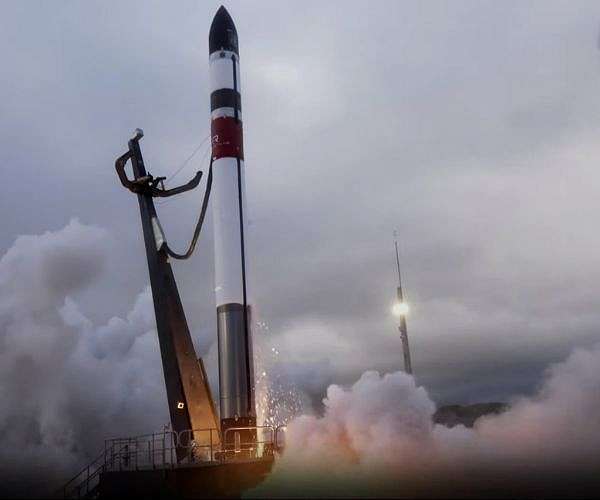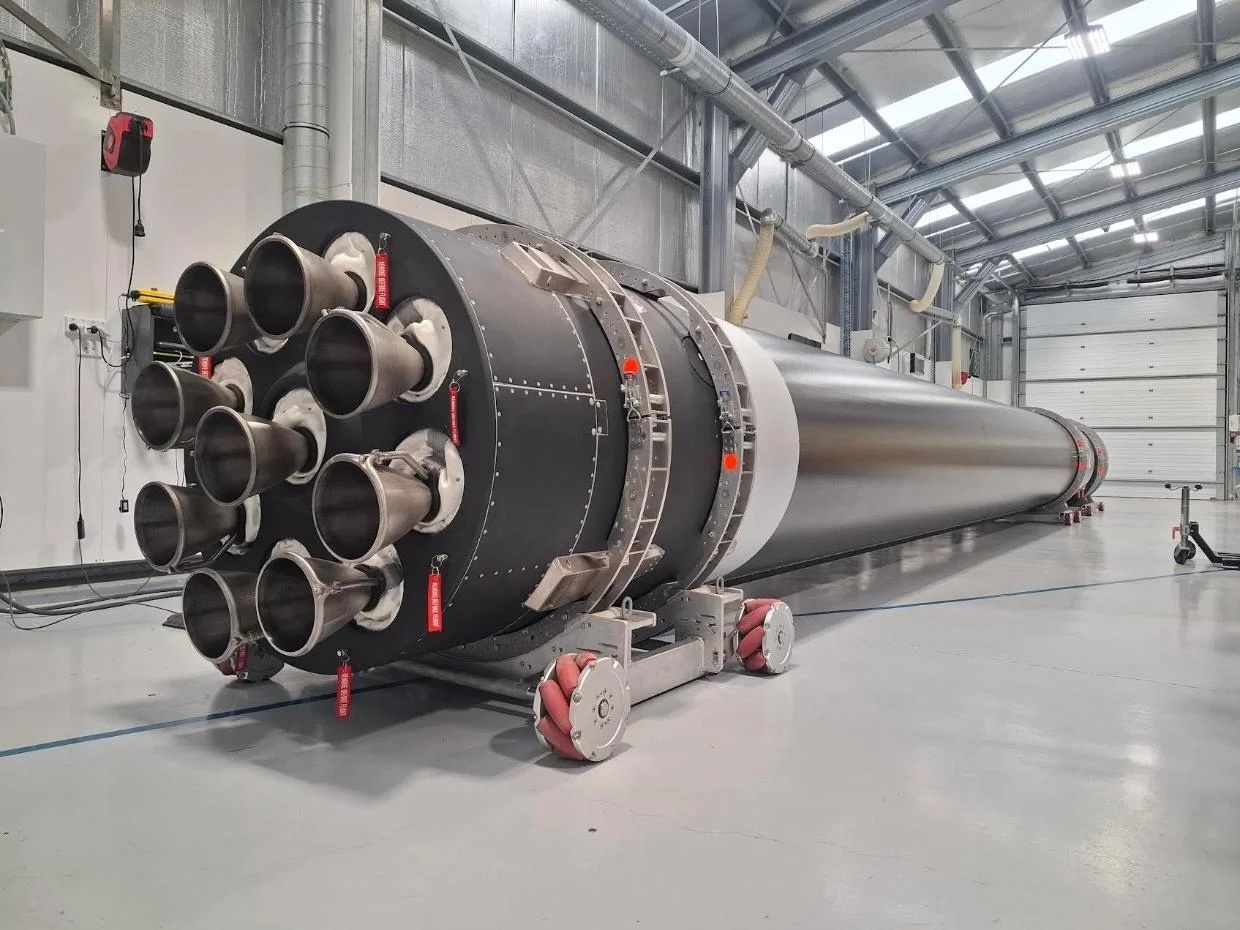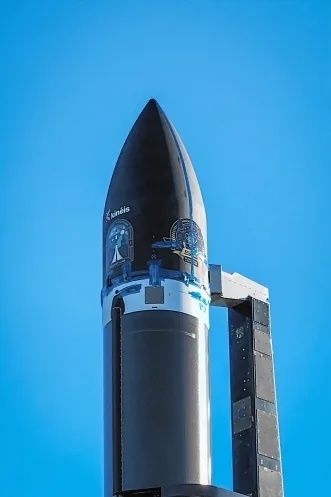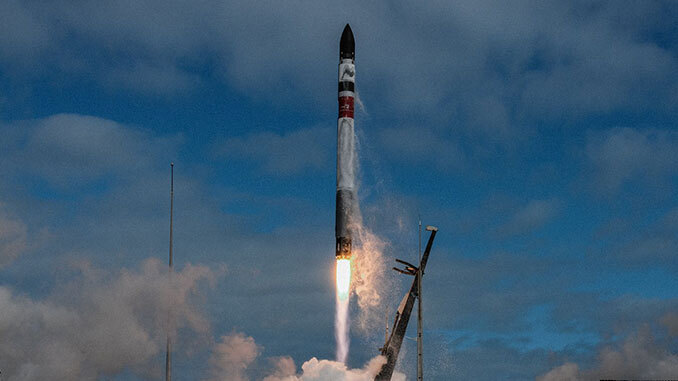10.06.2024

Rocket Lab USA, Inc. (Nasdaq: RKLB) ("Rocket Lab or "the Company) has announced the launch window for its 50th Electron mission, which will deploy five Internet-of-Things (IoT) satellites for French company Kineis.
The 'No Time Toulouse' mission is scheduled to launch from Rocket Lab Launch Complex 1 in Mahia, New Zealand during a 14-day launch window that opens on June 19th, 2024, NZST.
The mission is the first of five dedicated Electron launches for Kineis, supported by investors including the French government's space agency CNES (Centre National d'Etudes Spatiales) and CLS (Collecte Localisation Satellites). Kineis' new constellation will enhance global IoT connectivity, allowing the connection of any object anywhere in the world and ensuring the transmission of targeted data to users in near-real time with low energy consumption. The constellation also includes a ship-tracking Automatic Identification System (AIS). Once deployed, these technologies will enable Kineis to expand across multiple industries and scale from 20,000 connected devices to millions.
"The launch industry is not an easy or forgiving one. Making it to your first launch is not a given, so reaching 50 Electron launches is an enormous achievement and a rare feat in the history of spaceflight, said Rocket Lab founder and CEO Sir Peter Beck. "I'm immensely proud of the team for bringing an industry-defining rocket to market, making frequent and reliable dedicated small launch a reality for the first time. We're excited to launch Kineis on this historic mission and grateful for the continued support of all the customers who have flown on Electron since our very first mission in 2017. Thank you for helping us to make Electron one of the most frequently launched rockets of all time.
Kineis CEO Alexandre Tisserant said: "Kineis is proud and confident to entrust the deployment of its constellation to Rocket Lab. The Electron launcher meets our technical requirements for the positioning of five nanosatellites for each dedicated launch. Our teams and those of Rocket Lab are well coordinated to ensure the satellite separation phase with the launcher. We are very honoured that this first launch for Kineis coincides with Electron's 50th flight!
The 'No Time Toulouse' launch has been customized to meet Kineis' mission requirements, providing greater control over launch schedule, orbit, and deployment parameters than larger rideshare missions. Specific mission parameters include:
- Instantaneous launch window,
- After the first Curie engine burn to circularize the Kick Stage's orbit, Curie will ignite again for an eight second burn to set a specific argument of perigee, enabling Kineis to deploy five satellites to precise locations for each of the five launches,
- All five satellites will be deployed in a precise sequence in singles and pairs to build out the constellation exactly as Kineis needs it,
- Finally, Curie will conduct a perigee lowering burn to reduce the Kick Stage's orbital lifetime to maintain space sustainability.
Quelle: SD
+++
Rocket Lab targets 14-day launch window for 50th Electron mission
Space company Rocket Lab is targeting a two-week window from June 19 for the 50th mission of its Electron small orbital launch vehicle.
It will be the 46th Electron launch from Mahia since the first test flight in May, 2017. The other four launches have been from the company’s complex in Virginia, USA.
The mission - named “No Time Toulouse” - will deploy five satellites for Kinéis, a company backed by private and public investors including the French government’s space agency CNES, to improve global Internet-of-Things connectivity.
In total, five Electron launches were planned for Kinéis, deploying a 25-satellite constellation, Rocket Lab said.
Kinéis’ new constellation would connect any object anywhere in the world and guarantee the transmission of targeted and useful data to users, in near-real time, with low energy consumption.
The company would be able to scale up from 20,000 devices connected to millions.

Rocket Lab's 50th Electron rocket being prepared for lift-off.
SUPPLIED/BUSINESS WIRE
“The launch industry is not an easy or forgiving one,” Rocket Lab founder and CEO Sir Peter Beck said in a statement.
“Making it to your first launch is not a given, so reaching 50 Electron launches is an enormous achievement and a rare feat in the history of spaceflight.”
Quelle: Stuff
----
Update: 20.06.2024
.
Counting down to historic 50th launch

Rocket Lab is scheduled to launch its 50th Electron rocket from the Onenui Station launch site at Māhia tomorrow. The No Time Toulouse rocket is set to fly at 6.13am.
Rocket Lab is set to launch for the 50th time tomorrow morning from its launch site on Onenui Station at Mahia.
The “No Time Toulouse” mission will be a major milestone for the company since Electron missions began in May 2017. It is scheduled to blast off at 6.13am tomorrow.
Lifting off from Mahia’s Launch Complex 1, the mission is to deploy five satellites for French IoT company Kinéis.
The mission is the first of five dedicated Electron launches for Kinéis, a company backed by private and public investors - including the French Government’s space agency CNES (Centre National d’Études Spatiales) and international space-based solutions provider CLS (Collecte Localisation Satellites) - to improve global IoT connectivity.
Across these five launches, Rocket Lab will deploy Kinéis’ complete constellation of 25 satellites.
“The launch has been tailored specifically to meet Kinéis’ mission requirements, giving them greater control over launch schedule, orbit and deployment parameters than would be possible on a larger rideshare mission,” a Rocket Lab spokesperson said.
“Tailored mission parameters for this launch include an instantaneous launch window.
“After the first Curie engine burn to circularise the Kick Stage’s orbit, Curie will ignite again for an eight-second burn to set a specific argument of perigee, enabling Kinéis to deploy five satellites to a precise orbit,” the spokesperson said. “All five satellites will be deployed in a precise sequence in singles and as pairs to build out the constellation exactly as Kinéis needs it.
“Finally, Curie will conduct a perigee lowering burn to reduce the Kick Stage’s orbital lifetime to keep space sustainable.”
Quelle: The Gisborne Herald
+++
Rocket Lab to launch 50th Electron rocket with ‘instantaneous launch window’
- Rocket Lab will attempt to launch it’s 50th Electron rocket on Friday morning.
- The rocket is due to launch at 6.13am from Māhia Peninsula.
- A successful launch would see the Electron rocket reach 50 launches faster than any other commercially developed rocket in history.
New Zealand company Rocket Lab will attempt to launch it’s 50th Electron rocket on Friday morning.
The launch requires an “instantaneous launch window”, meaning it needs to launch at 6.13am or an attempt will have to be made another day.
“If we have to stand down tomorrow for any reason we have backup opportunities over the next 12 days,” Rocket Lab said.
It will launch from Rocket Lab’s Launch Complex-1 at Māhia Peninsula.
A successful launch would see the Electron rocket reach 50 launches faster than any other commercially developed rocket in history, Rocket Lab said.
Electron rockets are 18m tall, weigh 13,000kg, and have launched 190 satellites into space since missions began in May 2017.
The mission, named “No Time Toulouse”, will deploy five satellites to collect high-resolution images of Earth for the French company Kinéis.
It’s the first of five dedicated Electron launches for Kinéis, across these five launches Rocket Lab will deploy 25 satellites.
A livestream of the launch will be available on Stuff on Friday morning.
Quelle: Stuff
----
Update: 21.06.2024
.
Rocket Lab successfully launches its 50th Electron rocket

Rocket Lab successfully reached a milestone that few commercial rockets achieved and at a pace that outperformed its competition. The company launched its 50th Electron rocket to date just seven years after the vehicle’s debut in May 2017.
The instantaneous liftoff from Launch Complex 1 at New Zealand’s Mahia Peninsula happened at 6:13 a.m. NZST on Friday, June 21 (2:13 p.m. EDT, 1813 UTC on Thursday, June 20).
Onboard the rocket were five satellites on behalf of France-based internet of things company, Kinéis. This was the first of five dedicated flights for the company to deploy its full constellation, consisting of 25 satellites. All five on this flight were successfully deployed.
The satellites will orbit at an inclination of 98 degrees with the five satellites deploying “in a precise sequence in singles and as pairs to build out the constellation exactly as Kinéis needs it,” according to Rocket Lab.
The golden launch
The launch for Rocket Lab comes at a busy time for the business, which is pushing towards becoming an end-to-end space company. That includes multiple upcoming missions for U.S. agencies, like the National Reconnaissance Office and the U.S. Space Force as well as preparing for a planetary mission to Mars with Blue Origin’s New Glenn rocket as the ride to space.
Prior to Electron’s 50th launch, Sir Peter Beck, the founder and CEO of Rocket Lab, said he and his team are immensely proud of reaching this milestone in the time that they did.
“Out of all the commercially developed rockets in the world, Electron reaching 50, we did it in the fastest amount of time. So, we scaled faster to 50 than anybody else, faster than the Falcon 9, faster than Pegasus, faster than anything else commercially,” Beck said. “And that’s a really hard thing to do because whether it’s a giant rocket or a little rocket, the scaling element is the same and it’s super, super hard.”

Beck said much of the Electron rockets flying today are quite similar to the rockets that kicked off their orbital launch business. He said in addition to their successes, they’ve also taken away a great deal from their failures as well.
“I prefer not to think about it because they’re such devastating moments. They’re incredibly painful. And yes, it’s true that after those moments, you build a better vehicle,” Beck said. “But I always remind the team to never, never be happy, because if you’re happy, the rocket gods will come down with a baseball bat and let you know who’s in charge.
“So, we’re always striving to improve the vehicle. Every opportunity we can to improve it or make it more reliable, we take. And it’s just the harsh reality of spaceflight: it’s incredibly difficult.”
He noted that they are continuing to book more and more Electron flights each year as they progress with the program and prepare to bring the larger and reusable Neutron rocket to market by mid-2025. But he said their pace of launch will continue to be driven by customer demand.

“Any CEO is going to say say that they want to see it scale vertically, right? The reality is, we scale with our customer demand. And the customer demand changes all the time, depending on geopolitical circumstances, where people are at in building their constellations and all the rest of it,” Beck said.
“What I will say is, this year, we sold more Electrons than we’ve ever sold before and next year is shaping up to be the same. So, we certainly hope that the scaling continues for the product, but it’s purely driven by market demand.
Quelle: SN
